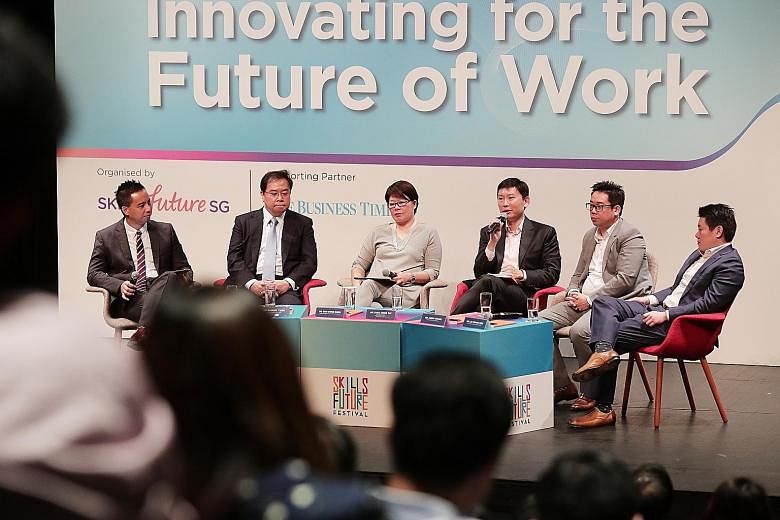Small and medium-sized enterprises (SMEs) will receive even more financial support to send their staff for skills training with a grant that could see a $2,000 training course fee slashed to just $60 with subsidies.
From Monday, companies - especially SMEs - can tap the Productivity Solutions Grant (SkillsFuture Training Subsidy) capped at $10,000 for each firm, said Senior Minister of State for Trade and Industry and Education Chee Hong Tat.
He was speaking at the launch of the SkillsFuture Festival yesterday at the National University of Singapore (NUS).
The grant can be used to cover up to 70 per cent of training expenses which, coupled with existing SkillsFuture subsidies, could see fees for courses aligned with SkillsFuture framework cut significantly for the firms.
Mr Chee said enterprise transformation and skills training go hand in hand. But he noted that while more employers are investing in training their workers, the progress so far has been uneven.
Citing a trend recently highlighted by the National Wages Council which showed SMEs investing less in training compared to larger companies, Mr Chee said: "They employ about 70 per cent of our workforce, but make up only one-third of employer-supported training.
"For our broad middle-tier of SMEs to upgrade their capabilities and enhance their competitiveness, we have to do better when it comes to worker training. Otherwise, the skills gap could become a bottleneck that limits economic competitiveness."
The new subsidy component was first announced at the Budget debate earlier this year.
The firms will need to submit their training plans for evaluation and approval by SkillsFuture Singapore (SSG).
Mr Chee said SSG is also working with intermediaries - such as trade associations, banks, IT companies and accounting firms - to develop training programmes for SMEs.
"Some enterprises, especially SMEs, may need more help with selecting the appropriate set of courses for their workers," he said.
"(Intermediaries) know their SME customers well and understand their business requirements, so they can provide tailored programmes to help SMEs digitalise and raise productivity."
For example, IT company IBM is working with SSG to develop programmes in artificial intelligence for the sector, said Mr Chee.
The SkillsFuture Festival, which is in its second edition, will run for six weeks and aims to reach out to over 200,000 visitors. Activities such as workshops will be held at places such as NUS and business hubs near Westgate and Changi City Point.
The festival is an annual event to "celebrate skills mastery and the pursuit of lifelong learning", and a good opportunity to take stock of the progress made, Mr Chee added.
One positive development, he said, is that more individuals and enterprises are recognising the importance of lifelong learning, with the national adult training participation rate increasing from 35 per cent in 2015 to 48 per cent last year.
A survey by the Manpower Ministry also found that 52 per cent of job openings for professionals, managers, executives and technicians last year did not consider academic qualifications as the main factor, up from 42 per cent in 2017.
Said Mr Chee: "These outcomes are encouraging for our SkillsFuture 'report card', but our journey has just begun."


